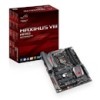Asus MAXIMUS VIII HERO User Guide - Page 174
RAMDisk, Creating/Deleting a RAMDisk drive
 |
View all Asus MAXIMUS VIII HERO manuals
Add to My Manuals
Save this manual to your list of manuals |
Page 174 highlights
4.11 RAMDisk RAMDisk is a data-storage software that reserves a part of your system's memory and turns it into a high-speed virtual drive where you can store cache files and game apps for instant access. The Dynamic Memory Allocation function can release the unused memory of RAMDisk back to the system when needed and helps extend the lifespan of your SSD or HDD. The following folders are not suitable for RAMDisk optimization. Moving them into the RAMDisk might negatively affect the performance of your system. • Swap file/Page file: The swap file is a permanent storage space used as the virtual memory expansion of the system memory. Moving the swap file into the RAM Disk simply defects the whole purpose of having it and may affect your system's performance. • Startup folders: Since RAMDisk loads during boot up together with the contents of the Junction folders, changing the location of the startup folders may cause system error and disable loading your RAMDisk. To launch RAMDisk, click . Creating/Deleting a RAMDisk drive Your RAMDisk drive allows you to place your favorite applications and files into RAM so you can utilize your RAM speed for better read/write performance. The files that are stored inside the RAMDisk are automatically backed up every time your PC is turned off. The startup time may take a while, depending on the size of your RAMDisk drive. To create RAMDisk drives: Click to create RAMDisk drives Click the drop-down arrow to choose a drive name for your RAMDisk Tick to enable Dynamic Memory Allocation function Move the slider to the right to set the size allocation Click to finish creating the RAMDisk drive Chapter 4 4-38 Chapter 4: Software Support















